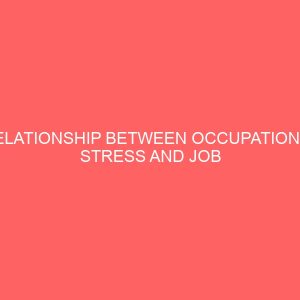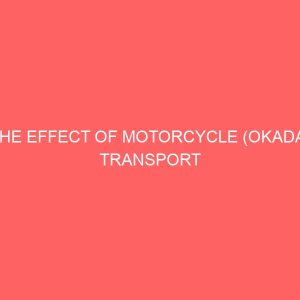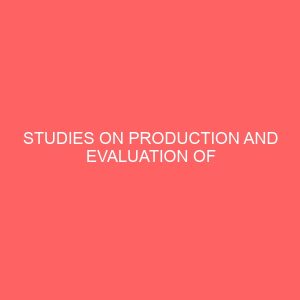Description
ABSTRACT
The purpose of this study was to find out the relationship between occupational stress and job satisfaction of university adult workers in Anambra state. Three research questions guided the study and three null hypotheses were tested at 0.05 level of significance. The design was a correlational survey, involving 1904 respondents which included academic and nonacademic university adult workers selected through proportionate stratified random sampling. A 32item questionnaire were developed to elicit information from the respondents. The data collected were analyzed using range of scores and Pearson Product Moment Correlation Coefficient Pearson, r to answer research questions while ztest and ttest of correlation were used to test hypotheses at 0.05 level of significance. The findings of the study revealed, among others, that: 1 Over 50 percent of the university adult workers have low level of occupational stress in Anambra State. 2 Over 55 percent of the university adult workers have high level of job satisfaction in Anambra State. 3 There is a very high positive relationship of 0.88 existing between the levels of occupational stress and job satisfaction of university adult workers. 4 There is a significant difference in the mean scores of academic and nonacademic university adult workers levels of occupational stress. 5 There is significant difference in the mean scores of academic and nonacademic university adult staff levels of job satisfaction. 6 There is significant relationship existing between the levels of occupational stress and job satisfaction of university adult workers. Based on the findings of the study, implications of the study were discussed; thereafter recommendations and conclusions were made. Among the recommendations are that, the government and her agencies controlling tertiary institutions should address the problems of job stress of academic and nonacademic university workers through reduction of workload. The university administrators should encourage employees assistance program through professional consultants or internal counseling and guidance unit. For example, the willingness of university administrators to provide moral and material support to workers who have experienced social and financial problems may help them to decrease daily job stress and increase their satisfaction in performing their job.
TABLE OF CONTENTSPages
TITLE PAGE i
APPROVAL PAGE ii
CERTIFICATION iii
DEDICATION iv
ACKNOWLEDGEMENTS v
ABSTRACT vi
TABLE OF CONTENTS vii
LIST OF TABLES x
CHAPTER ONE: INTRODUCTION 1
Background to the Study 1
Statement of the Problem 7
Purpose of the Study 9
Significance of the Study 9
Scope of the Study 11
Research Questions 11
Hypotheses for the Study 12
CHAPTER TWO: REVIEW OF RELATED LITERATURE 13
Conceptual Framework 13
Concept of Occupational/Job Stress 14
Concept of Job Satisfaction 28
Theoretical Framework 36
Models of Studying Job Stress 36
PersonEnvironmental Fit Model 36
Demand Control Support Stress Job Model 37
EffortReward Imbalance Job Stress Model 40
Cognitive Theory of Psychological Stress and Coping 42
Theories of Job Satisfaction 46
Herzbergs Two Factor Theory 47
The Fulfillment Theory 50
The Discrepancy Theory 52
Empirical Studies 54
Summary of Literature Reviews. 61
CHAPTER THREE: METHOD 63
Research Design 63
Area of the Study 63
Population of the Study 64
Sample and Sampling Technique 65
Instrument for Data Collection 65
Validation of the Instrument 66
Reliability of the Instrument 67
Method of Data Collection 68
Method of Data Analysis 69
CHAPTER FOUR: PRESENTATION AND ANALYSIS OF DATA 71
Research Questions 71
Testing the Null Hypotheses 72
Summary of Findings 75
CHAPTER FIVE: DISCUSSION OF THE RESULTS, CONCLUSION AND RECOMMENDATIONS 77
Discussion of the Results 77
Implications of the Study 81
Conclusions 82
Recommendations 84
Limitations of the Study 86
Suggestions for Further Research 86
REFERENCES 87
APPENDICES 99








Reviews
There are no reviews yet.